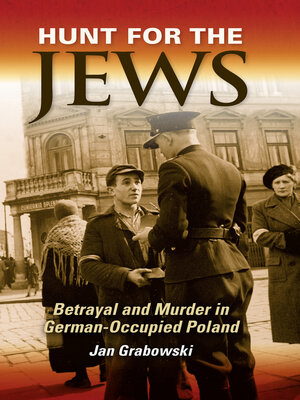
Sign up to save your library
With an OverDrive account, you can save your favorite libraries for at-a-glance information about availability. Find out more about OverDrive accounts.
Find this title in Libby, the library reading app by OverDrive.



Search for a digital library with this title
Title found at these libraries:
| Library Name | Distance |
|---|---|
| Loading... |
A revealing account of Polish cooperation with Nazis in WWII—a “grim, compelling [and] significant scholarly study” (Kirkus Reviews).
Between 1942 and 1943, thousands of Jews escaped the fate of German death camps in Poland. As they sought refuge in the Polish countryside, the Nazi death machine organized what they called Judenjagd, meaning hunt for the Jews. As a result of the Judenjagd, few of those who escaped the death camps would survive to see liberation. As Jan Grabowski’s penetrating microhistory reveals, the majority of the Jews in hiding perished as a consequence of betrayal by their Polish neighbors.
Hunt for the Jews tells the story of the Judenjagd in Dabrowa, Tarnowska, a rural county in southeastern Poland. Drawing on materials from Polish, Jewish, and German sources created during and after the war, Grabowski documents the involvement of the local Polish population in the process of detecting and killing the Jews who sought their aid. Through detailed reconstruction of events, “Grabowski offers incredible insight into how Poles in rural Poland reacted to and, not infrequently, were complicit with, the German practice of genocide. Grabowski also, implicitly, challenges us to confront our own myths and to rethink how we narrate British (and American) history of responding to the Holocaust” (European History Quarterly).
Between 1942 and 1943, thousands of Jews escaped the fate of German death camps in Poland. As they sought refuge in the Polish countryside, the Nazi death machine organized what they called Judenjagd, meaning hunt for the Jews. As a result of the Judenjagd, few of those who escaped the death camps would survive to see liberation. As Jan Grabowski’s penetrating microhistory reveals, the majority of the Jews in hiding perished as a consequence of betrayal by their Polish neighbors.
Hunt for the Jews tells the story of the Judenjagd in Dabrowa, Tarnowska, a rural county in southeastern Poland. Drawing on materials from Polish, Jewish, and German sources created during and after the war, Grabowski documents the involvement of the local Polish population in the process of detecting and killing the Jews who sought their aid. Through detailed reconstruction of events, “Grabowski offers incredible insight into how Poles in rural Poland reacted to and, not infrequently, were complicit with, the German practice of genocide. Grabowski also, implicitly, challenges us to confront our own myths and to rethink how we narrate British (and American) history of responding to the Holocaust” (European History Quarterly).







